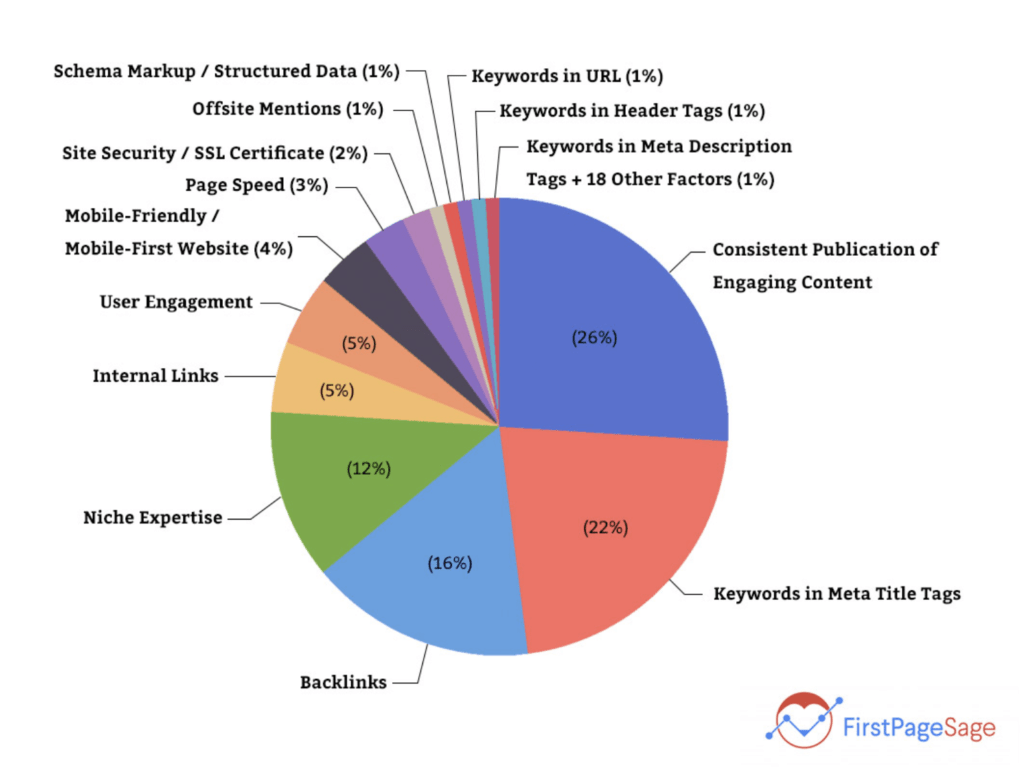Does Content Really Help SEO?
Does Content Really Help SEO?

If you saw my post last week, I talked about the fundamentals of SEO. One of the coolest studies I found while doing my own research was this simple chart of the Google Algorithm Ranking Factors. Basically, it charts what Google thinks are the most important elements on your website if you want to increase visibility and traffic to your site through SEO. As this chart shows, out of 15 different categories that can affect your SEO, the most important is Consistent Publication of Engaging Content.
 Which makes total sense to me. Logically speaking, the more content you have, the more chance you’ll have of someone seeing it, right? Well, not always. In fact, if you have an article or blog post on your website that goes on and on without providing a solution, making a point or offering any kind of significant information, your visitors will leave quickly which can actually hurt your rankings. So the key word here is “ENGAGING” content.
Which makes total sense to me. Logically speaking, the more content you have, the more chance you’ll have of someone seeing it, right? Well, not always. In fact, if you have an article or blog post on your website that goes on and on without providing a solution, making a point or offering any kind of significant information, your visitors will leave quickly which can actually hurt your rankings. So the key word here is “ENGAGING” content.
So, I know what you are gonna ask me next: “How do I write engaging content?” Before I answer that question, let’s first define the word “engaging” in the context of SEO.
Engaging Content is so genuinely appealing and interesting that it immediately grabs your attention and makes you want to learn more. Engaging means having the ability to stop someone in their tracks and draw them in by being informative, insightful, inspiring and even entertaining.
It’s not just about great writing or storytelling – it’s about the visuals as well. Here are some cool tips and resources so you can increase your SEO game.
- Find what people are searching for. Duh. There are 5.6 billion Google searches per day. What are they searching for? Wouldn’t it be awesome if you had special insight into what people needed so you can write about it and answer their questions? Well, here’s a free tool you can use. It’s called Answer the Public. Click on this link, type in your area of specialty and voila! You’ll get a list of questions that people are asking online about your subject. You’ll be surprised at some of the popular things that people are searching that you haven’t thought of in your own field.
- Use Large Headers and Sub-headers. Make it stand out. Because, most of the time, before someone commits to reading your content, they will quickly pan the page to see if it’s worthwhile. And while skimming through, they’ll first read what’s most catching to the eye – the large headers and sub-headers. Not only should they be bigger, but they should use words that immediately capture a reader’s attention.
- Use Graphics. We are naturally drawn to images. Create or add graphics to illustrate your point, set the mood or spark an inspiration.
- Use Keywords. Not just one, but 5-10. And categorize these keywords into 3 types: Primary, Secondary and Additional.
-
- The Primary keyword is your main focus, so let your title reflect that. Use the primary keyword to drive the bulk of the content forward.
-
- Secondary keywords are complementary keywords to the primary one, but just slight variations. Have 3-5 talking points and use the secondary keywords to support it.
-
- Additional keywords can be other related words that can be phrased differently but mean the same thing. This is a way to get variations of your main keywords in there to provide additional padding.
- Incorporate Internal Links. This is a great way to keep the visitor on your site longer. Referencing another post from your existing site is a great way to create more engaging content and provide the visitor with more relevant information while letting Google know how cool you are.
- Be Consistent. Consistency in your voice helps people get to know you, and will keep them coming back if they like what they read. If you are a great storyteller, keep writing relate-able and relevant stories to continue to communicate your point. Also, be consistent in posting so people can start counting on you for new content and looking forward to it. Best case scenario, your content can become part of the regular rhythm of people’s lives.
- Be You. The most engaging content is content that’s written by someone who’s not only knowledgeable, but also someone who’s passionate. Let them know how much you love and enjoy sharing, teaching, informing and entertaining. It will shine through. I always say, people can spot a fake…so, you be you. You are the only you and that’s why they’ll want to read it.
So, to answer the original question, does content really help SEO? The answer is resounding YES! Follow these tips and you’ll be well on your way to adding more traffic and eventually adding more clients to your business.
Here’s to the engaging content you’re going to create – can’t wait to see what you have to share!





Leave a Comment